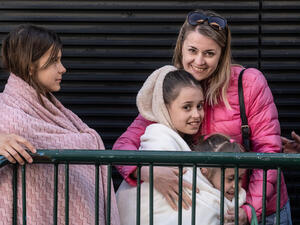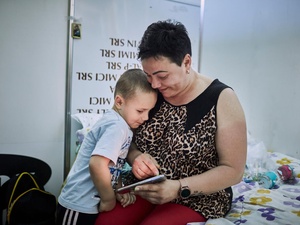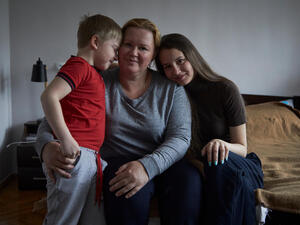Update on Lesvos and the Greek islands
Update on Lesvos and the Greek islands
UNHCR staff on the Greek islands have worked throughout the week to provide help to refugees, migrants and host communities affected by a four-day shipping strike that ended this morning.
An estimated 20,000 refugees and migrants are currently on the islands, placing considerable strain on the limited reception facilities of several islands. This situation has underscored UNHCR's repeated calls for improved reception conditions and increase reception capacity in Greece. The recent agreement of more reception places in Greece will be a key factor in stabilizing the situation, and supporting the relocation programme. UNHCR is working with the EU and Member States to support this initiative.
Progress was made this week with the first planned relocation of asylum-seekers from Greece to European Union countries -- in this case Luxembourg. A total of 30 Syrians and Iraqis were relocated on the first flight.
Here's a quick overview of the current situation on various islands and our work this week to help ease the pressures caused by the ferry strike.
On Lesvos, the number of arrivals dropped slightly yesterday, but there were already an estimated 7,000 to 10,000 refugees and migrants on the island Wednesday, most of them in and around the main city of Mytilini. Hundreds were staying in the port area in camping tents and thousands at the Moria site. UNHCR supported the Government in increasing reception, including with housing units and a large UNHCR Rubb hall warehouse tent. Yet the reception capacity is far too limited obliging people to stay in the open at night, including women and children. In addition to transportation, UNHCR also had to distribute blankets, sleeping mats and high-energy bars to help those outside to stay warm. UNHCR also used loudspeakers to inform people about the strike, as well as other relevant information.
On Leros, there were an estimated 3,400 refugees and migrants as of yesterday, among a total local population of some 8,000. Obviously, this put a strain on public services, including water and electricity. UNHCR staff on Leros are identifying those with specific needs and prioritizing them for what little accommodation space is available. We are also erecting more family refugee housing units, but the overcrowding makes finding space extremely difficult. We are also working on water and sanitation improvements, including installing pumps. We are working with the police and the Coast Guard in distributing assistance, including blankets. Food is also in short supply, and even local shops are running low because the shipping strike halted normal deliveries to the island. Volunteers, however, have distributed some food.
On Chios, there were at least 1,700 new arrivals yesterday, bringing the total waiting on the island to at least 2,400. There is a spike in arrivals currently, expected to continue for as long as the weather is good. There is a shortage of accommodation and people are sleeping in the municipal garden, where UNHCR has erected about 80 tents for those most at risk. A UNHCR large Rubb hall tent at the port is full, as are local hotels. A new UNHCR accommodation site in Souda may be ready by today, which will help ease the strain.
On Samos, good weather and calm seas saw more arrivals yesterday (Thursday), estimated at around 900 - mainly Syrians. That brings the refugee and migrant population waiting on the island to an estimated 3,500. There is a shortage of accommodation. Some people are staying at an identification centre, while about 2,500 are in the port area, where the most vulnerable sleep in 16 containers brought by the local authorities. Many new arrivals have pitched their own tents in the port, while others are sleeping outside on the ground or on UNHCR mats. Overcrowding makes distribution of aid difficult, but UNHCR is identifying those with specific needs and facilitating registration. Food is being distributed by the municipality, the military, an NGO and volunteers. UNHCR contributes with high energy bars.
On Kos, good weather and calm seas meant continuing arrivals and another tragedy at sea yesterday that left a 4-year-old child dead and a 6-year-old missing. UNHCR staff report more Afghan and Iranian families arriving, although Syrians remain the majority. On the island, there are few local resources available for the refugees and migrants. All hotels are fully booked and the archaeological park, where most of the people spend the night, is overcrowded. UNHCR appealed to the municipality to open a basketball arena, a theater or a local stadium for accommodation, but was refused. UNHCR has intensified the delivery of assistance, including the provision of blankets and sleeping mats through Kos Solidarity.
In nearby Kalymnos, the local community support network has provided good support for the arrivals, including accompanying survivors of a recent shipwreck to Kos for funeral services. About 250 refugees are currently on the island. New arrivals stay in hotels or a vacant building the municipality has made available. UNHCR is developing an emergency site at the port that will include 16 family refugee housing units managed by the municipality.
Under these circumstances, throughout the islands, thousands of refugee women and children are having to stay out in the open at night, or in overcrowded and inadequate reception facilities, where they are exposed to all kind of risks, including sexual violence. Providing adequate shelter to them is essential in order to protect them and, with the arrival of winter, will soon become vital.
Unaccompanied and separated children are a growing concern, with UNHCR helping in family reunification and giving required support. UNHCR is also providing psychosocial assistance and legal aid to victims of shipwrecks. Volunteers and partners continue to be instrumental in filling some of the most acute gaps.
UNHCR will continue to support the Greek authorities on improving reception and registration on the islands. We are appealing for US$32 million for winter preparations in Greece. This is part of an overall US$96 million winter plan for Greece and the Balkans that we announced yesterday. For more details of that plan, visit our website: www.unhcr.org
For more information on this topic, please contact:
- In Athens (Regional), Ron Redmond on mobile +30 694 244 5037
- In Geneva, William Spindler on mobile +41 79 217 3011









